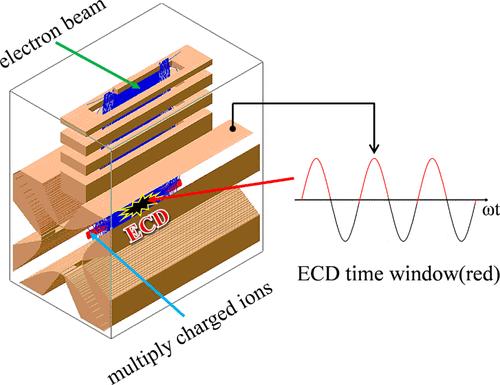在射频线性离子阱中实现无磁场辅助的电子俘获解离--一项模拟研究
IF 3.1
2区 化学
Q2 BIOCHEMICAL RESEARCH METHODS
Journal of the American Society for Mass Spectrometry
Pub Date : 2024-09-11
DOI:10.1021/jasms.4c00287
引用次数: 0
摘要
如果不使用磁场聚焦电子,就很难将低能量电子束注入传统的射频线性离子阱进行电子俘获解离(ECD)。在这项研究中,模拟了电子在射频场中注入并通过线性离子阱传输的动态过程,以确定电子在射频阶段的减速范围,从而满足电子俘获解离(ECD)的能量要求。通过对阴极施加随时间变化的补偿电压,扩大了 ECD 时间窗口。确定了阴极电压与射频电压相位之间的关系。施加补偿电压后,ECD 时间窗增加到整个射频周期的 49.4%。在 0 至 0.975 π 的射频电压相位之间,至少有 98.7% 的电子可以注入 ECD 反应区,其中 94% 的电子能量小于 3 eV。电子能量范围也很容易上移,以实现热电子俘获解离。本文章由计算机程序翻译,如有差异,请以英文原文为准。

Achieving Electron Capture Dissociation in the Radio Frequency Linear Ion Trap without the Assistance of a Magnetic Field─A Simulation Study
It is extremely difficult to inject a low-energy electron beam into a conventional radiofrequency (RF) linear ion trap for electron capture dissociation (ECD) without using a magnetic field to focus the electrons. In this study, the dynamic process of electrons in an RF field during their injection and transmission through a linear ion trap was simulated to determine the range of the RF phase where the electrons can be decelerated to meet the energy requirement for ECD. The ECD time window was expanded by applying a time-dependent compensation voltage to the cathode. The relationship between the cathode voltage and the phase of the RF voltage was determined. The ECD time window was increased to 49.4% of the total RF cycle after applying a compensation voltage. Between the phases of RF voltage of 0 and 0.975 π, at least 98.7% of electrons can be injected into the ECD reaction zone, and 94% of them had an energy less than 3 eV. The range of electron energy can also easily be shifted upward to enable hot electron capture dissociation.
求助全文
通过发布文献求助,成功后即可免费获取论文全文。
去求助
来源期刊
CiteScore
5.50
自引率
9.40%
发文量
257
审稿时长
1 months
期刊介绍:
The Journal of the American Society for Mass Spectrometry presents research papers covering all aspects of mass spectrometry, incorporating coverage of fields of scientific inquiry in which mass spectrometry can play a role.
Comprehensive in scope, the journal publishes papers on both fundamentals and applications of mass spectrometry. Fundamental subjects include instrumentation principles, design, and demonstration, structures and chemical properties of gas-phase ions, studies of thermodynamic properties, ion spectroscopy, chemical kinetics, mechanisms of ionization, theories of ion fragmentation, cluster ions, and potential energy surfaces. In addition to full papers, the journal offers Communications, Application Notes, and Accounts and Perspectives

 求助内容:
求助内容: 应助结果提醒方式:
应助结果提醒方式:


